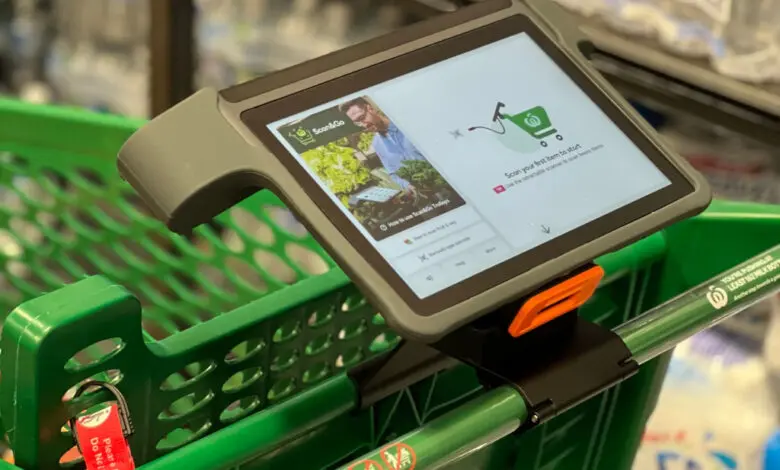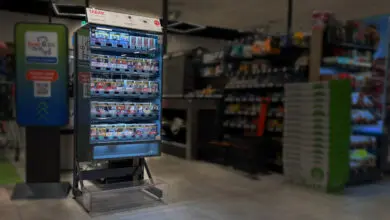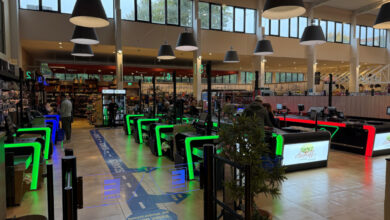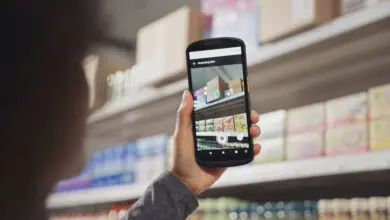Guest Feature: Transforming Retail Efficiency with Hanshow’s Smart Cart

The Hanshow Smart Cart Solution is transforming retail by enhancing the shopping experience, boosting operational efficiency, and strengthening customer loyalty. Awarded honours a LSA Tech for Business in 2024, the Smart Cart Solution marks a significant leap in retail technology, seamlessly merging efficiency, sustainability, and innovation to enhance the shopping experience.
With the added operational efficiencies and deeply integrated customer engagement created by the smart cart platform, retailers can optimise staff productivity by reducing the time spent on routine tasks like traditional checkout procedures. This allows store associates to focus more on high-value activities such as assisting customers, enhancing the shopping experience, and ensuring shelves are well-stocked. The result is a more efficient, engaging environment for both customers and staff.
In 2024, the Smart Cart Solution was successfully launched at ten Woolworths stores in Australia as reported by The Retail Optimiser, where it demonstrated seamless integration into existing store infrastructure. The trial included the installation of 48 devices, three charging walls, and more than 400 trolleys within just one week.
No need to purchase new trolleys
The ergonomic clip-on design seamlessly integrates with existing shopping carts, while a dedicated charging wall ensures uninterrupted use, keeping trolleys powered throughout the day. This proof of concept highlights the scalability of the solution, making it a viable option for widespread implementation across various retail verticals.
Retail Industry Challenges in 2025 and Beyond
Retailers are currently facing a multitude of challenges that are impacting profitability. According to Deloitte’s 2025 Retail Industry Outlook, the industry has experienced stagnant growth in recent years, with a compound annual growth rate of 1.5 per cent to 3.5 per cent, depending on the sector. Margins have been squeezed by competition and consumer demands for convenient omnichannel experiences. Additionally, digital adoption costs are creating an urgency for innovative ways to address efficiency, build partnerships, and develop alternative revenue streams to compete in the immediate future. (Deloitte, 2025 Retail Industry Outlook)
Store Optimisation in the Age of AI
To address these challenges, retailers are focusing on store optimisation strategies. This includes enhancing operational efficiency through automation and technology. Generative artificial intelligence (AI) is moving beyond the hype cycle and demonstrating concrete successes. Retailers that offered generative AI tools like chatbots during Black Friday noted a 15 per cent better conversion rate, and six in ten retail buyers said that AI-enabled tools improved demand forecasting and inventory management in 2024. With digital efficiency looming, 2025 could be a breakthrough year, with advancements in merchandising, supply chain, and marketing. Additionally, 70 per cent of retail executives expect to have AI capabilities in place within the year to help personalise experiences.
Overcoming the Unified Shopper Experience Gap
The evolving shopper experience presents its own set of demands. Inflation has heightened consumers’ sensitivity to value, pushing retailers to deliver better deals while maintaining service quality. Expectations for speed and convenience continue to rise, compelling retailers to enhance efficiency across all touchpoints. Moreover, today’s shoppers seek personalised experiences, expecting tailored recommendations, promotions, and services that align with their individual preferences. In response, six out of ten retail executives anticipate that consumers will prioritize price over loyalty in the coming year. To attract these value-seeking consumers, retailers are focusing on strengthening loyalty programs, enhancing digital commerce, and improving the omnichannel experience.
Achieving a Greener Future
Sustainability is also at the forefront of retail transformation. Consumers increasingly expect retailers to adopt greener practices, making it essential for businesses to control food waste, reduce energy consumption, and minimise overall waste. Technology is playing a pivotal role in these efforts, enabling retailers to implement more sustainable operations while meeting both regulatory requirements and customer expectations for environmental responsibility. Notably, 73 per cent of Consumer Industry CXOs have increased investments in sustainability over the last year, reflecting the growing importance of environmental considerations in retail strategies.
As the industry evolves, retailers must strike a delicate balance between profitability, customer satisfaction, and sustainability, leveraging innovation to overcome challenges and thrive in a rapidly changing market.

Enhancing Customer Experience at Woolworths
Recognising the need for a more streamlined shopping experience, Woolworths integrated Hanshow’s Smart Cart Solution with its existing Scan&Go system, launching the Scan&Go Smart Trolley in 2024, as The Retail Optimiser reported. This next-generation shopping tool enables customers to scan and pack items as they shop, track their spending in real time, and complete payment either at a self-service kiosk or directly through the trolley’s NFC-enabled system. By eliminating bottlenecks at checkout, the Smart Trolley reduces congestion, shortens shopping times, and enhances convenience.
The Scan&Go Smart Trolley provides a seamless and intuitive shopping trip. Customers begin by scanning their Everyday Rewards card to unlock the device and attach it to their trolley. As they move through the store, they scan each item with the built-in scanner and pack groceries directly into their bags. When ready to check out, they proceed to a self-serve checkout, eliminating the need to rescan items.
Prevention intelligence prevents shrinkage
The Scan&Go Smart Trolley not only enhances shopping convenience but also helps customers manage their budgets more effectively. Advanced security features, including missed scan prevention and geolocation tracking, improve transaction accuracy and help reduce shrinkage.
Currently, Woolworths’ Scan&Go Smart Trolley’s tablet itself does not have a scale, however it integrates two high-performance visual sensor cameras. These cameras are mainly used to monitor and scan the items selected by customers in real time. Specifically, the visual sensor can identify the items placed in the shopping cart by capturing and analysing image data, ensuring that the barcodes or QR codes of these items are successfully scanned.
Retail Digitalisation Partner
Find out more about how Hanshow is helping retail companies to successfully master the future.
Portable and operable
This design avoids complex hardware modifications to the shopping cart while maintaining the portability and operability of the device. In addition, the use of visual sensors can also improve the accuracy of scanning, reduce manual input errors, and provide flexible space for future technology upgrades, such as the possible introduction of more advanced image recognition technology.
Adoption of the Scan&Go Smart Trolley has been overwhelmingly positive, with shoppers quickly adjusting to the intuitive interface. This has resulted in 15-20 per cent faster checkout times and reduced overall shopping duration by up to 20 minutes during peak hours.The solution’s high Net Promoter Score (NPS) reflects strong customer approval and underscores its success in enhancing the modern shopping experience.
Sustainable consumption encouraged
By reducing checkout times, optimising product recommendation and shopping routes, and offering greater convenience and accuracy for customers to track their budget and maximize savings on promotional offers in real time, this solution sets a new benchmark for modern retail operations and customer experience enhancement, helping businesses remain competitive in an evolving market.
Hanshow’s Smart Cart solution redefines the future of retail by integrating sustainability, accessibility, and efficiency. By eliminating printed barcodes for produce weighing, it enhances operational workflows while minimizing environmental impact. Its intuitive barcode scanning and guided navigation features improve accessibility, ensuring a more inclusive shopping experience for all customers. Additionally, the system encourages sustainable consumption by offering discounts on products with shorter shelf lives, helping shoppers save money while reducing food waste.
Collaboration with leading global retailers
Looking ahead, Hanshow, in collaboration with Microsoft and leading global retailers, is advancing smart cart technology through AI-driven innovation. By leveraging Microsoft’s Azure OpenAI platform, Hanshow is developing a highly interactive AI assistant that seamlessly synchronises online and offline shopping, offering personal recommendations and optimising the in-store experience. This continuous evolution underscores Hanshow’s commitment to shaping a smarter, more connected, and more sustainable retail future.
How Hanshow’s Smart Cart Delivers Solutions for Retailers
Hanshow’s new Smart Cart Solution is designed with flexibility and adaptability at its core, making it easy to tailor and integrate into a variety of retail environments. Equipped with an interactive screen, the smart cart provides real-time product information, and exclusive promotions to individual shoppers. These features foster customer loyalty and enhance the shopping experience, creating a journey that feels both engaging and customized to each customer’s needs.
Here are just a few advantages it can provide to retailers.
Intelligent Recommendations: Enhancing Personalisation with Hanshow Smart Cart
The Hanshow Smart Cart leverages AI-driven recommendations powered by membership systems to deliver personalised shopping experiences, and is GDPR compliant, allowing retailers to offer tailored product suggestions, increasing customer satisfaction and sales. Additionally, its location-aware technology provides real-time, relevant pick-up recommendations, ensuring a seamless and intuitive shopping journey.
Innovation for Revenue Growth: Boosting Sales with Hanshow Smart Cart
Hanshow Smart Cart introduces new in-store touchpoints like interactive screens and AI-powered engagement tools to enhance customer interaction. Multi-channel and multi-touchpoint marketing combines with omnichannel digital promotions and helps increase basket value, while real-time ad tracking ensures optimised campaign performance, maximizing revenue potential.
Strengthening Member Loyalty: Enhancing Engagement with Hanshow Smart Cart
Hanshow Smart Cart strengthens loyalty programs by integrating personalised coupons and unified shopping history across channels. Through a seamless, AI-driven shopping experience, retailers can increase retention, engagement, and brand affinity, making every customer interaction more rewarding.
Harnessing Data: Optimising Retail Operations with Hanshow Smart Cart
Hanshow Smart Cart enables comprehensive shelf-to-shelf shopping data tracking, providing retailers with real-time insights into consumer behavior. By analyzing these patterns, retailers can optimize inventory, enhance marketing strategies, and improve overall store efficiency through data-driven decision-making.
Smart and Efficient Operations: Automating Retail with Hanshow Smart Cart
Hanshow Smart Cart integrates AI-powered unscanned product detection to reduce shrinkage and prevent loss. Unified device management allows for batch upgrades and real-time fault detection, ensuring minimal downtime. HiLPC integration enables seamless connectivity with ESLs, streamlining product picking and pricing updates for improved efficiency.
Cost Reduction & Efficiency: Simplifying Integration with Hanshow Smart Cart
Designed for easy deployment, Hanshow Smart Cart features a clip-on design that integrates effortlessly with existing store carts. Standard SDKs simplify software development, while GDPR compliance ensures enterprise-grade data security. Additionally, its rapid charging technology allows for a full charge within two hours to keep cart operational, supporting uninterrupted service and store efficiency.




